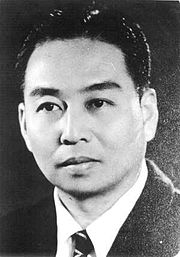Wu Zuguang | |
|---|---|
 | |
| Native name | 吴祖光 |
| Born | 21 April 1917 Beijing, China |
| Died | 9 April 2003 (aged 85) Beijing, China |
| Occupation | Playwright, film director and social critic |
| Language | Chinese |
| Alma mater | Sino-French University |
| Period | 1937–2003 |
| Literary movement | New Culture Movement |
| Notable works | City of Phoenix, Return on a Snowy Night, The Soul of the Nation, Itinerant Players |
| Spouse |
Lü En
(m. 1946; div. 1950) |
| Children | 3 |
Wu Zuguang (Chinese: 吴祖光; pinyin: Wú Zǔguāng; Wade–Giles: Wu Tsu-kuang; 21 April 1917 – 9 April 2003) was a Chinese playwright, film director and social critic who has been called a "legendary figure in Chinese art and literary circles".[1] He authored more than 40 plays and film scripts,[2] including the patriotic drama City of Phoenix, one of the most influential plays during the Second Sino-Japanese War, and Return on a Snowy Night, which is generally considered his masterpiece. He directed The Soul of the Nation, Hong Kong's first colour film, based on his own historical drama Song of Righteousness.
He was also well known as an outspoken critic of China's cultural policies,[3] both of the Kuomintang (KMT) and the Communist governments, and was repeatedly persecuted as a result. He fled to Hong Kong in 1945 to avoid being captured by KMT agents, and returned to Beijing after the foundation of the People's Republic China in 1949. He was denounced as a "rightist" during the Anti-Rightist Campaign and performed hard labour in the "Great Northern Wilderness" for three years, and was again persecuted during the Cultural Revolution. His wife, the celebrated pingju actress Xin Fengxia, refused to divorce him and became disabled after undergoing beatings and penal labour. Despite these ordeals, Wu continued to criticize government censorship and to call for political freedom, and was widely admired for his moral conviction.[1]